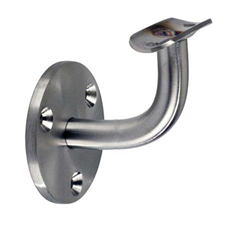Clarifying Handrail Bracket Clearance

Today, we're talking about something that can be a bit tricky—handrail bracket clearance. A required clearance between a handrail and other building elements continues to confound and confuse. Here’s a quick review of where present codes now stand.
The 1992 Americans With Disabilities Act Accessibility Guidelines (ADAAG) stated that there was to be an absolute dimension of 1-1/2″ between a handrail and a wall. This was a “grab bar” dimension which was part of an old version of ANSI A117.1. Its purpose was to prevent someone from getting caught between the wall and the handrail. The American National Standards Institute (ANSI) changed the notation to 1-1/2″ minimum in 1990.
The 2010 ADA Standards for Accessible Design now requires a 1-1/2″ minimum, as does the ICC, IRC, and ANSI A117.1.
The National Fire Protection Association (NFPA) however is not on the same page with their requirements. Created as part of their building code—NFPA 5000—but now included in NFPA 101—Life Safety Code, the NFPA requires a 2-1/4″ clearance between the wall and the handrail. This may result in a railing that will be passed by the building inspector but not accepted by the fire inspector. Note that as of Jan. 20, 2017, OSHA also requires a 2-1/4″ minimum clearance.
Codes also generally require that there be a 1-1/2″ clearance between the underside of the handrail and any obstruction—including the horizontal bracket arm. There is an allowance, however, for variations in the handrail size—for every 1/2″ of additional perimeter dimension over 4″, you may subtract 1/8″ from the clearance requirement. For example:
| OD | Perimeter | Subtract from 1-1/2″ Requirement | Clearance From Underside of Railing |
|---|---|---|---|
| 1.25″ | 3.92″ | 1-1/2″ | |
| 1.50″ | 4.71″ | -1/8″ | 1-3/8″ |
| 1.66″ | 5.21″ | -1/4″ | 1-1/4″ |
| 1.90″ | 5.97″ | -1/2″ | 1″ |
| 2.00″ | 6.28″ | -1/2″ | 1″ |
View all of our Wagner handrail brackets.
As always, we strongly recommend that you confirm all code issues with your local officials before specifying.
